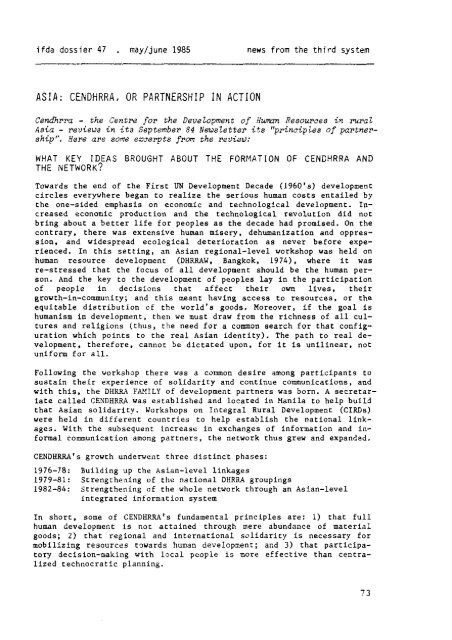Ifda dossier 47, May/June 1985
Ifda dossier 47, May/June 1985
Ifda dossier 47, May/June 1985
You also want an ePaper? Increase the reach of your titles
YUMPU automatically turns print PDFs into web optimized ePapers that Google loves.
ifda <strong>dossier</strong> <strong>47</strong> . may/june <strong>1985</strong> news from the third system<br />
ASIA: CENDHRRA, OR PARTNERSHIP IN ACTION<br />
Cendhrra - the Centre for the Development of Hwivm Resources in rural<br />
Asia - revieus in its September 84 Newsletter its "principles of partner-<br />
ship". Here are some excerpts from the revian:<br />
WHAT KEY IDEAS BROUGHT ABOUT THE FORMATION OF CENDHRRA AND<br />
THE NETWORK?<br />
Towards the end of the First UN Development Decade (1960's) development<br />
circles everywhere began to realize the serious human costs entailed by<br />
the one-sided emphasis on economic and technological development. In-<br />
creased economic production and the technological revolution did not<br />
bring about a better life for peoples as the decade had promised. On the<br />
contrary, there was extensive human misery, dehumanization and oppres-<br />
sion, and widespread ecological deterioration as never before expe-<br />
rienced. In this setting, an Asian regional-level workshop was held on<br />
human resource development (DHRRAW, Bangkok, 1974), where it was<br />
re-stressed that the focus of all development should be the human per-<br />
son. And the key to the development of peoples lay in the participation<br />
of people in decisions that affect their own lives, their<br />
growth-in-community; and this meant having access to resources, or the<br />
equitable distribution of the world's goods. Moreover, if the goal is<br />
humanism in development, then we must draw from the richness of all cul-<br />
tures and religions (thus, the need for a common search for that config-<br />
uration which points to the real Asian identity). The path to real de-<br />
velopment, therefore, cannot be dictated upon, for it is unilinear, not<br />
uniform for ail.<br />
Following the workshop there was a common desire among participants to<br />
sustain their experience of. solidarity and continue communications, and<br />
with this, the DHRKA FAMILY of development partners was born. A secretar-<br />
late called CENDHRRA was established and located in Manila to help build<br />
that Asian solidarity. Workshops on Integral Rural Development (CIR5s)<br />
were held in different countries to help establish the national link-<br />
ages. With the subsequent increase in exchanges of information and in-<br />
formal communication among partners, the network thus grew and expanded.<br />
CENDHRRA's growth underwent three distinct phases:<br />
1976-78: Building up the Asian-level linkages<br />
1979-81: Strengthening of the national DHRRA groupings<br />
1982-84: Strengthening of the whole network through an Asian-level<br />
integrated information system<br />
In short, some of CENDHRRA1s fundamental principles are: 1) that full<br />
human development is not attained through mere abundance of material<br />
goods; 2) that regional and international solidarity is necessary for<br />
mobilizing resources towards human development; and 3) that participa-<br />
tory decision-making with local people is more effective than centra-<br />
lized technocratic planning.
















